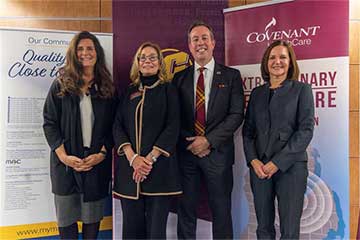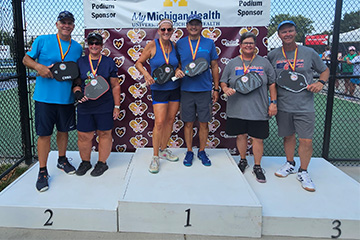Ensuring health care sustainability through recruitment, training and retention
The Central and Western Area Health Education Center encourages high school students to pursue health care careers
April Osburn, executive director of the Central and Western Area Health Education Center (AHEC) presented to the Board of Trustees at the February meeting. She spoke on the program’s efforts to create and cultivate future generations of health care professionals, specifically those with an interest in serving rural and underserved communities.
AHEC, housed at CMU, is part of the national AHEC program created by Congress in 1971 to recruit, train and retain a health professions workforce committed to underserved populations. Forty-five states have federally recognized AHEC programs. Osburn outlined the work being done in our communities.
Here in Michigan, the AHEC program is comprised of a statewide network with regional centers located in Detroit, Houghton Lake, Marquette and Mt. Pleasant. Their pillar programs focus on recruitment, training and retention. The pipeline program is a recruitment initiative designed to create a homegrown workforce of diverse health care professionals. The community-based student education activities encourage health profession students to work in underserved areas and continuing education programs in collaboration with government agencies, academic institutions and community groups increase knowledge and retention of health care professionals in shortage areas.
The Health Careers Pipeline Program (HCPP) endeavors to “grow our own” health care professionals by empowering high school students to pursue careers in the health professions. Through exposure to health career options, mentorship and health and wellness education, students will participate in engaging, hands-on enriching experiences that will foster personal growth and leadership characteristics. Studies indicate that early intervention programs like this significantly affect a student’s choice of a health career and that health professions students and residents often take jobs and serve where they are trained. The HCPP is the channel to help students develop their confidence and a support system for their journey into post-secondary education and beyond. Health Career Pipeline Programs are being offered in Mt. Pleasant, Saginaw, the Thumb region, and Grand Rapids. Programs such as this serve as recruitment tools for CMU. More than 1,000 high school students, undergraduate mentors, and medical students have already participated in the pipeline program. The success of our program has been measured by the number of students who have enrolled in CMU's graduate programs or medical school, as well as the number of undergraduates who have gone on to enroll at CMU.
Educational activities include clinical training opportunities that place health professions students in a variety of real-world settings such as migrant, urban and rural community health clinics and health departments that provide health care to rural and underserved populations. Students who participate in the AHEC service-learning programs develop an awareness of the economic and cultural barriers in health care delivery and have a better understanding of the complex needs of rural and underserved communities. Connecting students to these community populations helps facilitate future engagement and networking for health career students to remain in their clinical practice regions.
Additionally, we have the AHEC Scholars program, which is a national advanced learning opportunity that supplements classroom instruction. This course aims to prepare students for entry into the health professions workforce by teaching them important supplemental skills that aren't taught in their normal academic courses.
It allows students to network with other health professions students from all over Michigan and to learn how to provide care in an interdisciplinary environment while exploring current and emerging topics in healthcare. The AHEC Scholars program is designed for diverse applicants who have a strong interest in providing healthcare to underserved and rural communities in Michigan. We currently have medical residents and CMU medical students participating in this program.
In addition to providing valuable, interdisciplinary and supplemental classroom learning opportunities for health professions students preparing to enter the workforce, AHECs provide accredited continuing education programs and professional support to meet the needs of healthcare professionals, especially those practicing in rural and underserved areas. With an extensive network of academic partners and community collaborators, AHECs are designed to be responsive to local health needs and serve as an important link between academic training programs and community-based outreach programs. AHEC is one of the key partners and planners of the Annual Tribal Opioid Summit. Additionally, the National AHEC organization and American College of Rheumatology have awarded us a grant to implement a Rural Health Outreach Project. A total of four AHECs within the county were selected to offer these educational opportunities. These educational opportunities aims to increase exposure of rural healthcare providers to lupus by collaborating with AHECs to conduct virtual or in-person lupus educational and networking events with an ACR member rheumatologist.




